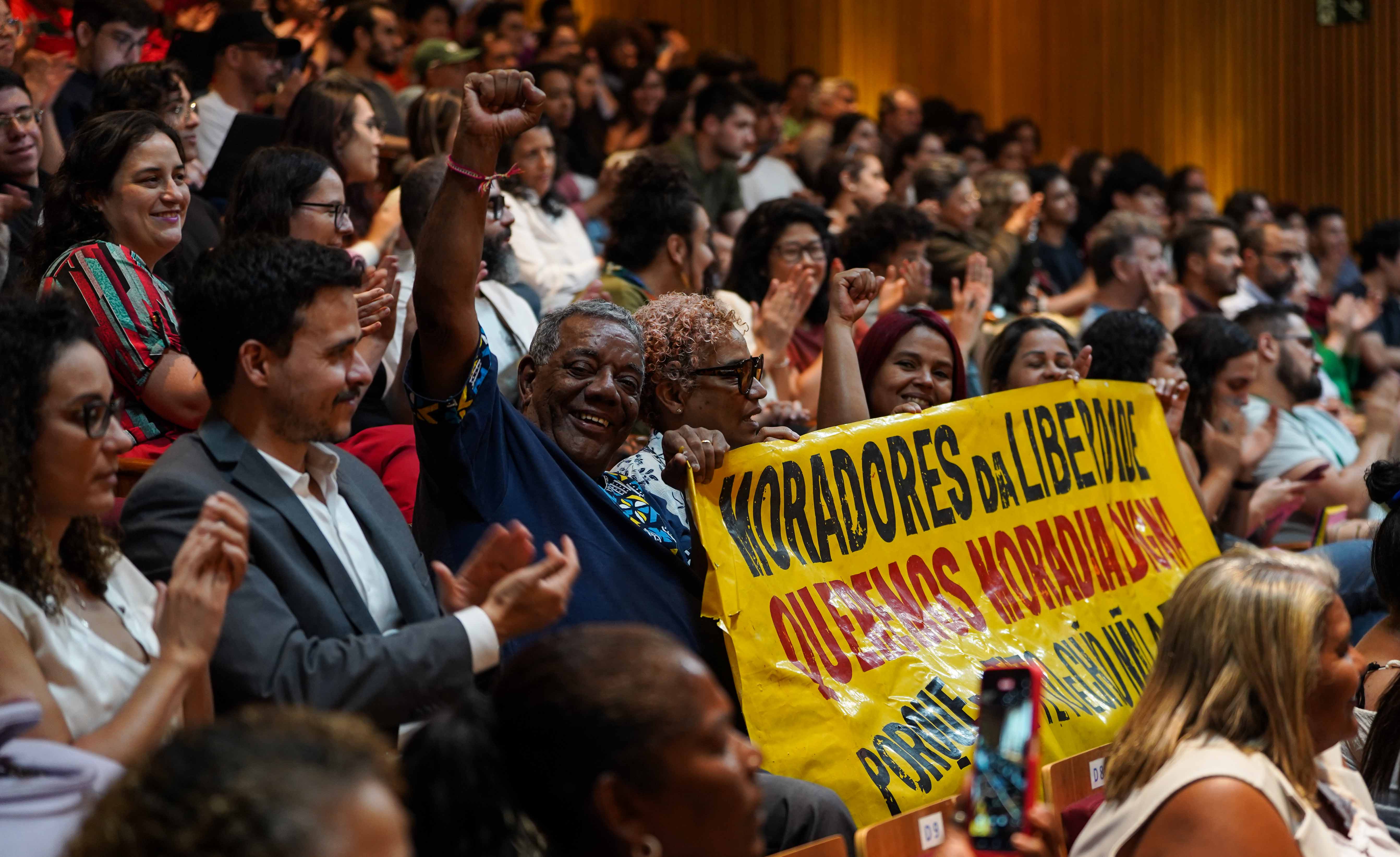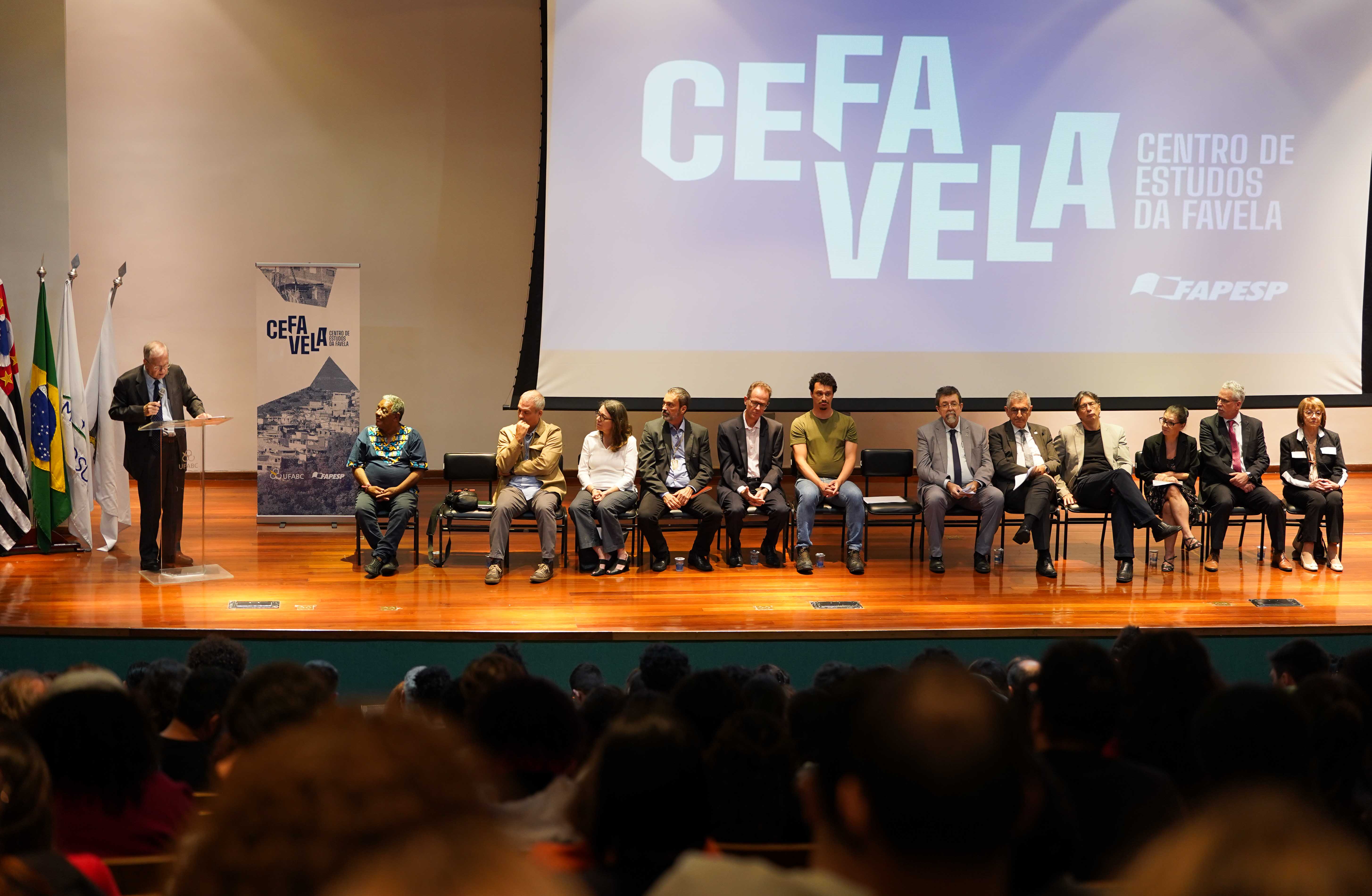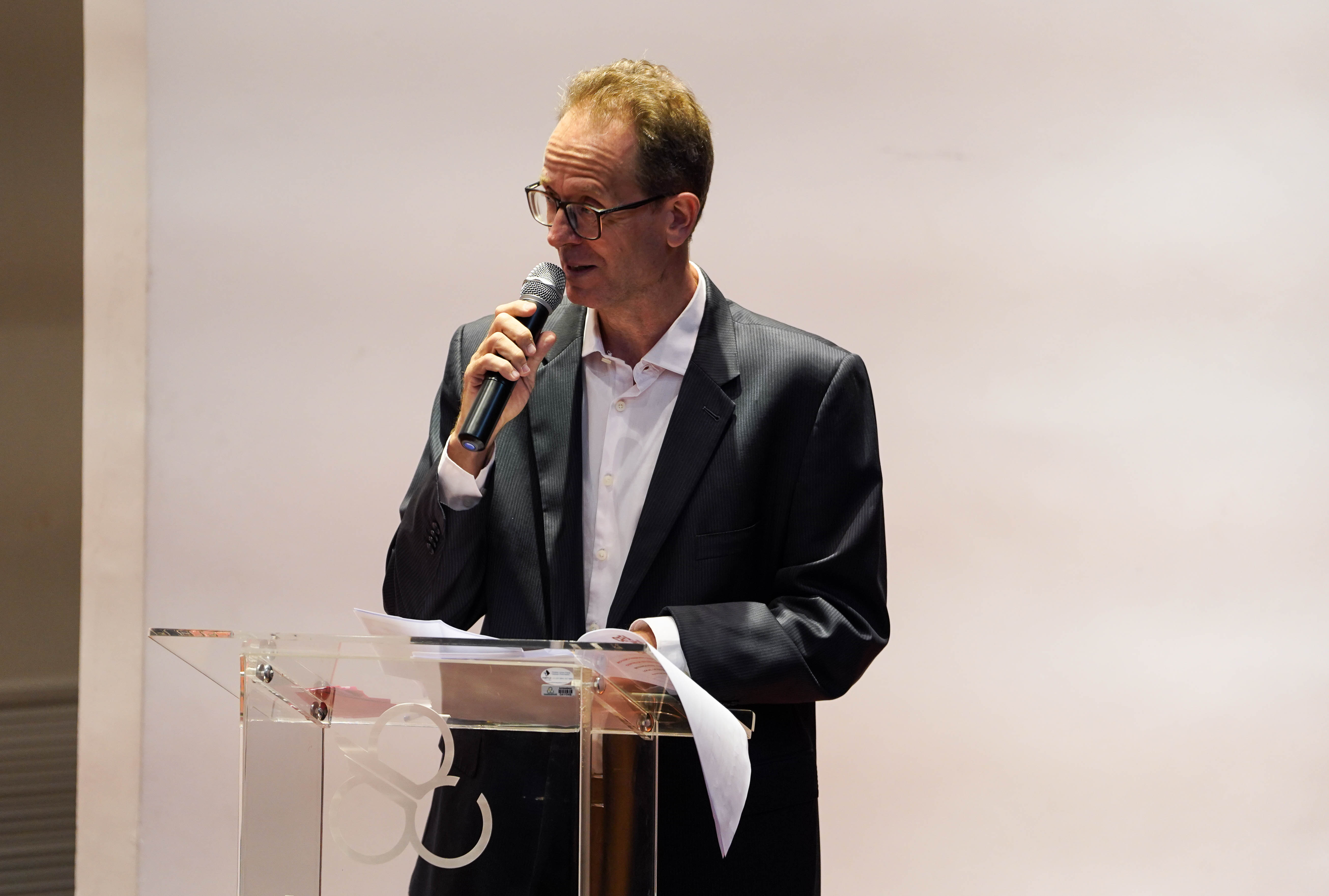


The event at UFABC was attended by heads of universities, researchers and large delegations of favela residents (photo: Daniel Antônio/Agência FAPESP)
Published on 10/21/2024
By José Tadeu Arantes | Agência FAPESP – The 2022 Brazilian population census conducted by the Brazilian Institute of Geography and Statistics (IBGE) shows that 6.6 million households are located in favelas. Almost 50% of the population in cities like Recife live in favelas, according to some studies. In São Paulo city, the proportion is 9.4% overall, reaching 32.7% in Vila Andrade, a neighborhood in the south of the city, 25.1% in Brasilândia (north), and 25% in the ABC region of metropolitan São Paulo – the data come from Mapa da Desigualdade survey (Portuguese for “Inequality Map”) carried out by the civil society organization Rede Nossa São Paulo.
In favelas and similar informal urban settlements, the low-income residents lack title to their land and homes, which are often shacks or other precarious structures and are especially vulnerable to disasters in the context of the global climate emergency.
FAPESP has set up a Center for Studies of Favelas (CEFAVELA) to garner, organize and disseminate knowledge of the territorial dynamics of favelas, the forms of reproduction of spatial inequality, and the potential and limits of urbanization policies and interventions to implement improvements. Hosted by the Federal University of the ABC (UFABC), CEFAVELA is funded via FAPESP’s Research, Innovation and Dissemination Center (RIDC) Program. Its remit is to conduct research, train people, transfer technology, and disseminate knowledge to society in collaboration with institutions, organizations and movements committed to the territorial agenda of the favelas.
The new center was officially launched on October 7 at UFABC. The event, which filled the university’s largest amphitheater, was attended by representatives of public institutions, researchers, faculty and students, as well as large and enthusiastic groups of favela residents. “The construction of this research center is fundamental for us, too, because we’ve had enough of being an object of study. We want to be partners,” said Benedito Roberto Barbosa, coordinator of the São Paulo Union of Housing Movements (UMMSP).
“This RIDC has an additional dimension. FAPESP’s support for the Center for Studies of Favelas exemplifies two convergent trends that we have strengthened in the last five years, in accordance with guidance from our Board of Trustees. First, the joint pursuit by researchers, companies and government of solutions based on science and technology to remove the obstacles to development in São Paulo state. Second, a vigorous impulse for projects that have public policy impacts. This is what we’re after, and these two things converge in this project,” Marco Antonio Zago, President of FAPESP, said during the launch ceremony.

Left to right: Marco Antonio Zago, Benedito Roberto Barbosa, João Whitaker Ferreira, Ana Maria Fonseca de Almeida, Wagner Alves Carvalho, Jeroen Johannes Klink, Leonardo Varallo, Dácio Roberto Matheus, Vahan Agopyan, Marcio Pochmann, Rosana Denaldi, Márcio de Castro and Maria José Soares Mendes Giannini (photo: Daniel Antônio/Agência FAPESP)
Joining Zago and Barbosa on the panel that presided over the launch event were Dácio Roberto Matheus, Rector of UFABC; Vahan Agopyan, São Paulo State Secretary of Science, Technology and Innovation; Leonardo Varallo, General Coordinator of Risk Mitigation and Prevention Plans, National Department for Peripheries, Ministry of Cities; Marcio Pochmann, President of IBGE; Jeroen Johannes Klink, Professor of Urban Planning and Economics at UFABC and Director of CEFAVELA; Rosana Denaldi, a professor at UFABC and Vice Director of CEFAVELA; Wagner Alves Carvalho, Pro-Rector of Research at UFABC; Marcio de Castro, Scientific Director of FAPESP; Ana Maria Fonseca de Almeida, Manager, Social Sciences, FAPESP’s Area Panel on Science, Humanities and Arts; Maria José Soares Mendes Giannini, Manager, FAPESP’s RIDC Program; and João Whitaker Ferreira, Director of the University of São Paulo’s School of Architecture and Urban Planning (FAU-USP).
“CEFAVELA reinforces UFABC’s own politico-pedagogic project, which seeks interdisciplinarity and aims to connect new knowledge with concrete solutions to contemporary problems such as social, gender and racial inequality, and environmental unsustainability and injustice,” Klink said.

Jeroen Johannes Klink, a professor at UFABC and Director of CEFAVELA (photo: Daniel Antônio/Agência FAPESP)
The center will focus on three main areas, he added: describing and analyzing the multiple facets of housing precariousness in favelas; understanding the new dynamics of favelas and the socio-spatial, economic and environmental changes favelas are undergoing; and understanding and improving public policy and interventions in favelas. “CEFAVELA will conduct in-depth case studies for Brazil and elsewhere, especially other Latin American countries, and in dialogue with experience in India and South Africa. It has 38 associated researchers: 11 in foreign academic institutions, 15 at UFABC, and 12 in other institutions in Brazil,” he said.
According to CEFAVELA Vice Director Denaldi, urbanization of favelas rarely achieves the necessary quality, leading to adequate environmental rehabilitation or solutions to all existing problems. “Besides the unsolved problems, new ones have to be dealt with. Favelas continue to be transformed by the activities of different players, including organized crime. Many urbanized favelas undergo an intense process of densification and verticalization, which overburdens the infrastructure in place, impairs accessibility, and involves low-quality housing. Permanently protected areas [APPs], free areas and public spaces created by urbanization processes are frequently reoccupied, so that new areas of precariousness and risk emerge,” she said.
More knowledge is needed about how the various players involved appropriate this territory, she went on, and about day-to-day practices aimed at real estate promotion and self-production of space. “This includes understanding more fully how the real estate market works in favelas, the variety of products sold, and by whom, as well as the financing mechanisms used in each market segment,” she said.
An urgent problem faced by residents in favelas is the permanent threat of eviction. “We have more than 1.5 million people threatened with eviction and removal in Brazil,” Barbosa said. Housing movements currently exist in 22 Brazilian states, and the latest national conference voted to undertake more occupations and fight harder against violence and eviction. It even adopted a resolution calling for “zero evictions”.
Impact of universities on society
FAPESP President Zago highlighted the role of CEFAVELA in the trajectory of UFABC, an extremely young university set up only 18 years ago. “Great universities, such as this one aims to be, are indispensable anchors for the growth and consolidation of the political, economic and cultural autonomy of nations. It’s not enough to erect buildings and classrooms. These alone don’t make a university. Laboratories must be equipped, and above all teams must be created. Genuine universities not only teach excellence but also have an impact on society. Universities must be connected to their community and region, transfer technology to the local production system, and participate in the search for solutions to socially relevant problems. This connection between universities and their communities is particularly important in Latin American countries,” he said.
For Zago, UFABC’s inclusion in the RIDC Program is a hallmark of quality assurance. “This program was created 25 years ago and is now the most competitive in FAPESP’s portfolio,” he said. “It’s harder to insert and approve a project in this than in any other program. Today is, therefore, a day to be permanently plotted on UFABC’s timeline because the proposal we’re commemorating here was exhaustively examined in several rounds of evaluation involving rigorous critical analysis by experts in Brazil and abroad. Its approval is clear testimony to the quality of the research, innovation activities and knowledge diffusion strategies proposed in this project.”
The last speaker was UFABC Rector Matheus, who recalled that the strength of FAPESP and São Paulo state’s universities derives from their autonomy, which is guaranteed by law. “We federal universities do our utmost to be centers of excellence in São Paulo state. We have the stimulus, we have the reference framework, but although we enjoy the academic autonomy enshrined in the Federal Constitution, we don’t have genuine administrative and financial autonomy. The previous administration also threatened to take away our academic autonomy. We resisted. But we have yet to construct effective administrative and financial autonomy,” he said.
“We would like to support more research centers like this one, and indeed the strategic units of the university, contributing to support for personnel, infrastructure and facilities, but we’re limited in our autonomy. But we’re not going to give up. We’ll forge ahead despite all our limitations. Allow me, therefore, to recognize our teams of technical personnel and researchers for their determination to tackle the challenge of doing first-class research under these difficult conditions. I’d like to say that CEFAVELA is a true scion of UFABC and UFABC is a true guardian of CEFAVELA, because UFABC’s mission statement includes interdisciplinarity, excellence and social inclusion. This university was born from the social movements of the unionized factory workers of the ABC and their demand for higher education in the region. And it materialized in the first lecture, delivered on September 11, 2006. Inclusion doesn’t just mean transmitting knowledge. It must also involve the community directly in the construction of that knowledge. Let the people who live in favelas stop being a mere object of research and become researchers themselves, alongside the academics and our students.”
A recording of the ceremony held to launch CEFAVELA can be watched at: www.youtube.com/live/f4uOusdWVOc.
Source: https://agencia.fapesp.br/53094